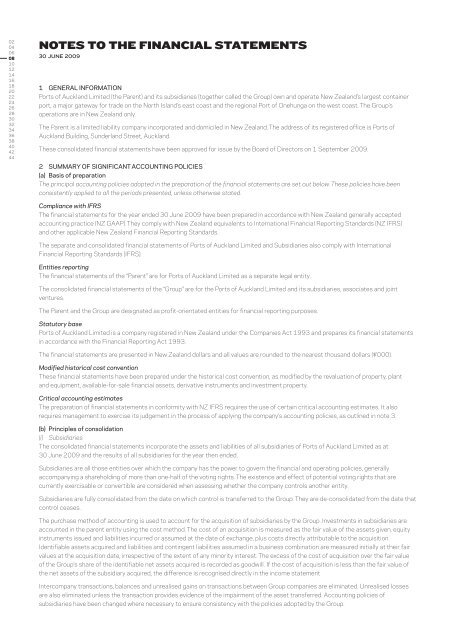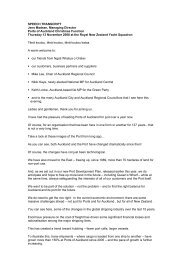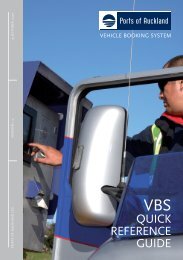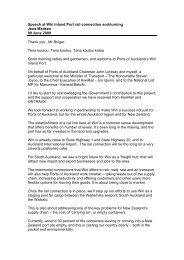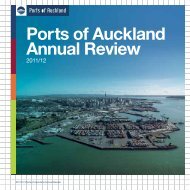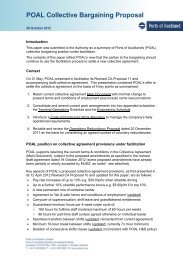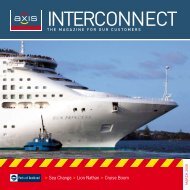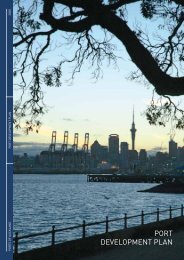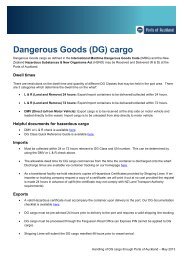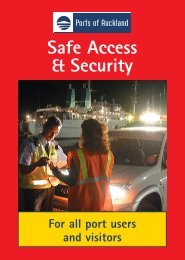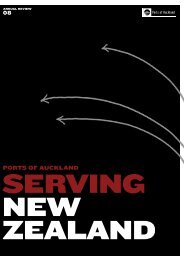Download Financial Statements - Ports of Auckland
Download Financial Statements - Ports of Auckland
Download Financial Statements - Ports of Auckland
You also want an ePaper? Increase the reach of your titles
YUMPU automatically turns print PDFs into web optimized ePapers that Google loves.
02<br />
04<br />
06<br />
08<br />
10<br />
12<br />
14<br />
16<br />
18<br />
20<br />
22<br />
24<br />
26<br />
28<br />
30<br />
32<br />
34<br />
36<br />
38<br />
40<br />
42<br />
44<br />
NOTES TO THE FINANCIAL STATEMENTS<br />
30 JUNE 2009<br />
1 General information<br />
<strong>Ports</strong> <strong>of</strong> <strong>Auckland</strong> Limited (the Parent) and its subsidiaries (together called the Group) own and operate New Zealand’s largest container<br />
port, a major gateway for trade on the North Island’s east coast and the regional Port <strong>of</strong> Onehunga on the west coast. The Group’s<br />
operations are in New Zealand only.<br />
The Parent is a limited liability company incorporated and domiciled in New Zealand. The address <strong>of</strong> its registered <strong>of</strong>fice is <strong>Ports</strong> <strong>of</strong><br />
<strong>Auckland</strong> Building, Sunderland Street, <strong>Auckland</strong>.<br />
These consolidated financial statements have been approved for issue by the Board <strong>of</strong> Directors on 1 September 2009.<br />
2 Summary <strong>of</strong> significant accounting policies<br />
(a) Basis <strong>of</strong> preparation<br />
The principal accounting policies adopted in the preparation <strong>of</strong> the financial statements are set out below. These policies have been<br />
consistently applied to all the periods presented, unless otherwise stated.<br />
Compliance with IFRS<br />
The financial statements for the year ended 30 June 2009 have been prepared in accordance with New Zealand generally accepted<br />
accounting practice (NZ GAAP). They comply with New Zealand equivalents to International <strong>Financial</strong> Reporting Standards (NZ IFRS)<br />
and other applicable New Zealand <strong>Financial</strong> Reporting Standards.<br />
The separate and consolidated financial statements <strong>of</strong> <strong>Ports</strong> <strong>of</strong> <strong>Auckland</strong> Limited and Subsidiaries also comply with International<br />
<strong>Financial</strong> Reporting Standards (IFRS).<br />
Entities reporting<br />
The financial statements <strong>of</strong> the “Parent” are for <strong>Ports</strong> <strong>of</strong> <strong>Auckland</strong> Limited as a separate legal entity.<br />
The consolidated financial statements <strong>of</strong> the “Group” are for the <strong>Ports</strong> <strong>of</strong> <strong>Auckland</strong> Limited and its subsidiaries, associates and joint<br />
ventures.<br />
The Parent and the Group are designated as pr<strong>of</strong>it-orientated entities for financial reporting purposes.<br />
Statutory base<br />
<strong>Ports</strong> <strong>of</strong> <strong>Auckland</strong> Limited is a company registered in New Zealand under the Companies Act 1993 and prepares its financial statements<br />
in accordance with the <strong>Financial</strong> Reporting Act 1993.<br />
The financial statements are presented in New Zealand dollars and all values are rounded to the nearest thousand dollars ($’000).<br />
Modified historical cost convention<br />
These financial statements have been prepared under the historical cost convention, as modified by the revaluation <strong>of</strong> property, plant<br />
and equipment, available-for-sale financial assets, derivative instruments and investment property.<br />
Critical accounting estimates<br />
The preparation <strong>of</strong> financial statements in conformity with NZ IFRS requires the use <strong>of</strong> certain critical accounting estimates. It also<br />
requires management to exercise its judgement in the process <strong>of</strong> applying the company’s accounting policies, as outlined in note 3.<br />
(b) Principles <strong>of</strong> consolidation<br />
(i) Subsidiaries<br />
The consolidated financial statements incorporate the assets and liabilities <strong>of</strong> all subsidiaries <strong>of</strong> <strong>Ports</strong> <strong>of</strong> <strong>Auckland</strong> Limited as at<br />
30 June 2009 and the results <strong>of</strong> all subsidiaries for the year then ended.<br />
Subsidiaries are all those entities over which the company has the power to govern the financial and operating policies, generally<br />
accompanying a shareholding <strong>of</strong> more than one-half <strong>of</strong> the voting rights. The existence and effect <strong>of</strong> potential voting rights that are<br />
currently exercisable or convertible are considered when assessing whether the company controls another entity.<br />
Subsidiaries are fully consolidated from the date on which control is transferred to the Group. They are de-consolidated from the date that<br />
control ceases.<br />
The purchase method <strong>of</strong> accounting is used to account for the acquisition <strong>of</strong> subsidiaries by the Group. Investments in subsidiaries are<br />
accounted in the parent entity using the cost method. The cost <strong>of</strong> an acquisition is measured as the fair value <strong>of</strong> the assets given, equity<br />
instruments issued and liabilities incurred or assumed at the date <strong>of</strong> exchange, plus costs directly attributable to the acquisition.<br />
Identifiable assets acquired and liabilities and contingent liabilities assumed in a business combination are measured initially at their fair<br />
values at the acquisition date, irrespective <strong>of</strong> the extent <strong>of</strong> any minority interest. The excess <strong>of</strong> the cost <strong>of</strong> acquisition over the fair value<br />
<strong>of</strong> the Group’s share <strong>of</strong> the identifiable net assets acquired is recorded as goodwill. If the cost <strong>of</strong> acquisition is less than the fair value <strong>of</strong><br />
the net assets <strong>of</strong> the subsidiary acquired, the difference is recognised directly in the income statement<br />
Intercompany transactions, balances and unrealised gains on transactions between Group companies are eliminated. Unrealised losses<br />
are also eliminated unless the transaction provides evidence <strong>of</strong> the impairment <strong>of</strong> the asset transferred. Accounting policies <strong>of</strong><br />
subsidiaries have been changed where necessary to ensure consistency with the policies adopted by the Group.


